
24 minute read
Photo facts of busy season
In the rhythm of the harvest
WWe will start immediately with the numbers. They reflect the real picture of the harvest, which at the time when the magazine was being made up was in full swing. All in the country as of August 17, more than 86% of areas were harvested and more than 7 million tons of grain were harvested. By the end of the harvest, we expect 9.5 million tons of grain.
Advertisement
By the way, the weather is favorable for the agrarians this year. There are rains, but fortunately they are not long. But for those who are on the combine harvester, are not pleased with bad weather. That’s why they use as much of every day as possible.
And this year’s wheat is very good: the ears are full of grain.
As for the Belarusian media during this period, we note that they show increased interest in how the harvesting campaign is going. The pages of the central newspapers and related sites are full of photos of advanced farm machinery operators, elderly and young. There are also girls among them. Family crews, fathers with sons and daughters, brothers with sisters, husbands with wives also work on the harvesters. Young people are also actively manifesting themselves. There are about 750 of youth crews!
We offer the readers of our magazine a mosaic of news and facts from different regions of the country, where the “Harvest –2020”, which, according to one of the harvesters, is the crown of agricultural work.

Belta
Elena Maksimik helps to harvest in Berestovitsky District
Have earned for a wedding!
The family crew from Berestovitsa District, Grodno Region, where a student daughter works together with her father, harvest‑ ed over 1 thousand tons of grain. Today, the advanced harvesters were honored right in the field. Congratulations were received by an experienced combine harvester Alexander Maksimik, and his assistant, his 20‑year - old daughter Elena. In their category — and the family works on the combine “Polesye GS10” — they are one of the leaders in the area. For the mechanic, this is the 20th harvest‑ ing, and for his daughter — the first one. Now she’s on vacation, finished her third year of the Philology Department at Yanka Ku‑ pala State University in Grodno. —Since childhood I used to run to my father in the field to see him working. And this year I decided to work with him. Of course, at first it was hard, then I took on a rhythm, — s ays the girl. There are a lot of duties, she emphasizes: to help hang or remove the harvester, wash, blow, serve the combine, lubricate if necessary. Sometimes we had to use a sickle to help remove the laid ears.
The girl admits that she got very tired. But the understand‑ ing came that bread is never easy. We worked for just over two weeks with almost no weekends. There were only free days when the weather was bad. — B ut I certainly don’t regret working like that. If everything works out, next year I will definitely work as an assistant to my father, — smi les the girl. The money earned, she plans to spend on the wedding. The celebration is scheduled for September.
The assistant’s contribution to the final result is also appreci‑ ated by her father: — It’s always easier to work with a family member. We are quick to understand each other. And the daughter herself is ac‑ tive, hard-working, so there were no questions. The harvest was good, and we sometimes harvested 100 tons or more a day. That’s why the mood is great, — s ays the combine harvester. By the way, he will soon drive a tractor, will do plowing and prepare the basis for next year’s harvest.
The leaders in the field were honored by representatives of the in‑ dustry trade union. As a reward, they received merit certificates and a m onetary award. Harvest has already reached the equator in Grodno Region. There are more and more farmers who have achieved sig‑ nificant results in their work. For example, more than 90 crews have p assed one-thousand grain yield, among the drivers involved in the delivery of grain, there are more than 100 thousand people. There are both youth and family crews among the top workers.
Combiner-veteran
In Stolbtsy District the combine harvester Gennady Zvirko is honored, who has participates in harvesting 55 times. He’s 73 years old. He devoted his whole life to agriculture.
He works at Agronemansky OJSC: during the harvest time as a combine harvester, at the rest of the time as the foreman of the production site. So he works in agriculture all year round. He used to work on a variety of harvesters and always showed high results. According to Gennady Zvirko, there are no special secrets in the work of a combine harvester. The main thing is to work smoothly and thoroughly to harvest grain in time and not to leave a spikelet.
He has received many awards. These are the medal “For Val‑ orous Labour” (1970), and Certificate of Honor of the Supreme Soviet of the BSSR (1974), and the Order of the Red Banner of Labour (1975). In 2015 he was awarded the Order of Honour. But Gennady Zvirko wants to move beyond. “If I am healthy, I will be working”,— h e says cheerfully.
And he does not get tired of working, willingly passing on his experience to young people. “For us, such people are an example of love for land, for our work, for honest work. He charges us with his energy, satisfaction from the work done”, — s aid Denis Zakhar‑ chuk, Director of Agronemansky OJSC.
Minister of Agriculture and Food Ivan Krupko presented Gen‑ nady Zvirko with a badge of honor of the Ministry of Agriculture and Food “For Merits in Agriculture”. “Thank you for setting an ex‑ ample for our youth. To work for so many years, harvesting grain, you must really love this land, love your country,” — he said.
Gennady Zvirko was also awarded by the Belarusian Trade Union of Agricultural Workers, Stolbtsy District Executive Com‑ mittee, Agronemansky OJSC.
y b . sb
Agronemansky OJSC is a large farm in Stolbtsy District with 6 thousand hectares of arable land, it employs about 230 people. This year, more than 40% of the area of grain has been harvested.
Angelina+Evgeny
In Mogilev Region, 13 women work as combine assistants — to‑ gether with their fathers, brothers and husbands. In Shklovshchyna t here are three of them — more than in other districts. These crews receive special treatment and honor. For example, in Khotimsk District Larisa Andreychenkova and her husband have been har‑ vesting for 9 seasons. And Natalya Lakovich in Slavgorod District j oined her father in the field for the first time. Each of them is proud of her new occupation. And the crews work with their beautiful assistants together with a huge army of Belarusian grain farmers.
Many acquaintances do not believe that Angelina Andreykovets has been working as a combine operator’s assistant for the second season. This year, the girl graduated from the Philology Department at Gomel State University and will be teaching school children the Belarusian language in a month. Meanwhile, together with her friend Evgeny Shevchik, she is harvesting grain in Shklov Govyady Agro OJSC — holding managing company. The young couple are glad that a year ago they decided to work together on the field. Although the girl had to overcome her inner fear — both in front of a powerful, at first glance, formidable machine, and sometimes biased attitude to the situation when a woman takes up a traditionally male business. —I will not complain about the fact that the work of a com‑ bine operator’s assistant is difficult, — A ngelina admits. — I w ork with joy and pleasure. Zhenya takes care of me, helps me. Little by little, he teaches me. Of course, I can’t sit at the wheel of the combine harvester yet, though I have tractor driving license, I re‑ ceived it at school. It is my duty to clean the equipment after taking to the field, to make sure that there are no stones or other obstacles on the way, to see that the grain is harvested without loss.
At seven o’clock in the morning, they, together with a team of fellow harvesters, are already in the machine yard. By 9 a. m . on a fine day, the combine harvester is ready for work. Only the rains interrupt the harvest, so sometimes you have to wait at the edge of the field until the spikes dry up. But the cabin of the com‑ bine harvester is cozy, cool, air conditioned. There is water in the
The 55th harvest of the Honored Combiner Gennady Zvirko
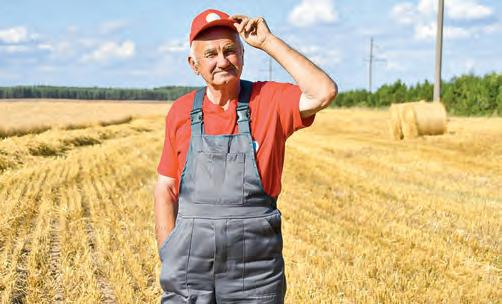
y b . sb
Angelina Andreykovets and Yevgeny Shevchik are working together
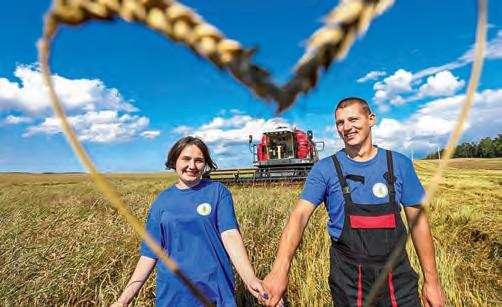
fridge, which is delivered to the field together with dinner. There is a spacious field of grain around. They work with comfort.
Evgeny Shevchik, a young mechanic, who came to the farm three years ago from Brest Region, was entrusted with a new com‑ bine harvester. Now he is sincerely pleased that he chose Angelina as his assistant: —Th e combine harvester works perfectly. My cabin is clean and orderly, I always have a snack, which Angelina cooks, because on fine days we are in the field till dark — so I don’t feel hungry. Of course, lunches and water are delivered to us. Such joint work brings us together, brings us closer. My assistant is hardworking, responsible, and beautiful.
Vasiliy Malevich from Vertelishki
Vasily Malevich, one of the best combine harvesters in Pro‑ gress-Vertelishki APC, Grodno District, is doing his 37th harvest‑ ing. This week he turned 64. As usual, on his birthday, he was in the field operating his favorite combine harvester.
And he has been working at the combine harvester since 1983. Malevich jokes that half of his colleagues were not yet born when he started to work on the field as a mechanic. However, the joke is not far from the truth: when Vasily began working, there were combines with an open cabin and a light tarpaulin canopy. In the season 2020, having harvested one thousand tons of grain, Ma‑ levich does not slow down — he has already threshed 1650 tons.
Laconic Vasily Vasilyevich says a few words about his work with unabashed love: —I grew up in a village, since childhood I needed no toys — just let me run my hands over agricultural equipment and sit in the cabin. In the end, I have achieved what I aspired to. I have been working on a collective farm since I was 16. The years passed by quickly, now I am probably the oldest mechanic on our farm. I once told the managers: I will work in the field as long as I can be useful. Of course, work is work. And what does he think of having the same surname as the world famous author of “Black square? Is he familiar with his work? —Kazimierz Malewicz? Yes, a little familiar with his work. He’s an original artist. And I know the painting “Black Square”. Although I have my own squares here! Today, for example, I am working on a
y b . sb spring rapeseed field — 100 hectares, enough space to gather speed. By the way, I usually work till 22:00, and then I hurry home. In sum ‑ mer, my grandchildren come to Vertelishki from the city. They won’t g o to bed until they talk to their beloved grandfather. And I, no mat‑ ter how tired I am, always watch the weather forecast for tomorrow: i s it going to rain? It can disorder our harvesting plans…
The Drozdys have always been in the lead
Brothers Andrey and Sergey Drozdy from Kirovsk District, Mogilev Region — represent the famous in Kirovsk District dynas‑ ty, they are working together with at Rassvet named after K. P.Or‑ lovsky OJSV. They are successors of the agricultural dynasty: their twin fathers Nikolay and Anatoly are still working at the OJSC. B e‑ fore their father, Andrey and Sergey’s grandfather, used to work t here as well. The Drozdys have always been in the lead. Nikolay, for example, has repeatedly won the national threshing yield com‑ petition. — When we were small we were dying to be taken to their work, — S ergey recalls. — I f the father or uncle took us to the combine harvester, it was delight! When we grew up, the inter‑ est in agriculture became more meaningful. We asked a lot of q uestions, paid attention to where, what and how things were done. Now we follow the example of our relatives and we have never regretted it. —Without too much modesty, I will say that my brother and I are handymen, and a good condition of the combine harvester allows us to be in the lead,— Andrey smiles.— Sergey is a spe‑ cialist in the repair of equipment, in his hands the work is going fine, but I am not lagging behind either. I’ve got some experience. This is not the first harvesting season for me: I managed to work in Rassvet before being drafted in the army, and when I returned after the service this year, I got a job here again.
Working shoulder to shoulder with a loved one is much easier, the Drozdys admit: — We are brothers not only in blood, but also in spirit. We don’t share responsibilities with each other, but we share the bur‑ den equally. We solve problems quickly, we can rely on each other.
Such mutual help, support and full understanding allow us to achieve excellent results. The brothers are the best not only in the
Vasily Malevich is the best of the best
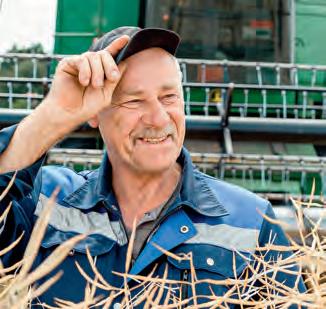
y b . sb
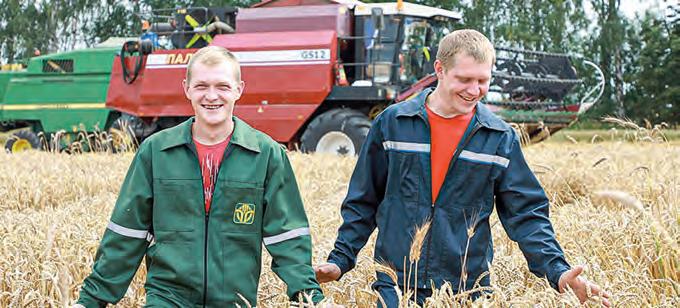
Brothers-machine operators Andrey and Sergey Drozdy are representatives of the dynasty
home farm, but also in the district. This year the output yield in Mogilev Region is very good. For comparison: if last summer the average yield was 25.9 centners per hectare, this season it is 33.1.
The calling to be a grain producer is in the genes
26‑year-old Marina Kuleshova, English language teacher and Master of Philological Sciences, has been working the fourth sea‑ son as a combine operator’s assistant to her father at Mirny Agro OJSC in Chausy District. The romantic appeal of a grain producer beckons her and her brother from town to the field every summer.
They get up at 6 am. The family crew of the Kuleshovs — father Svyatoslav, daughter Marina and her elder brother Andrey — have breakfast and rush to the machine yard: as soon as dew disappears, they get down to work on the field. Yesterday the weather was per‑ fect — they returned home at 11 pm. —As soon as I got my driver’s license four years ago, I got a job as a combine operator’s assistant on our farm Mirny Agro. My brother and I have been helping my father since childhood. At first, when we were small, we asked to just sit in the cabin, then the dad started to let me give him tools and lubricate spare parts. Now I can clean the har ‑ vester by myself, twist the nut, turn the pipe to make the grain pour o ut, and if necessary, drive the combine. I am thinking of getting a license to drive a tractor — then I can become a combine harvester. —Of course, I am not a match for my father and brother — they have a whole collection of awards. My father was once given a car at the regional Dazhynki, last year Andrey won the district competition among youth crews.
The Kuleshovs have a calling to be a grain producer is in the genes. Svyatoslav Vasilyevich’s father used to be his assistant — he worked on the farm as a driver. From year to year his wife asks him to take her as an assistant, but there is a problem: she does not have a driver’s license. —This is my 28th harvesting,— Svyatoslav Kuleshov agreed to talk during lunch in the field: every minute can’t be wasted. — My daughter is a great help. She as a woman takes care: gives a mug of cold kvass on the move, doesn’t forget to take “packed lunch”, keeps the cabin neat and clean. And it is easier when there are four hands: she helps me with the documents, and can fix the equipment.
y b . sb
This year’s yield is very good, but the rain makes the family nervous. That’s why they try not to waste a single minute. How‑ ever, Andrey is lagging behind a little: the combine harvester broke down a couple of times. But it can’t be helped — it is iron. But Ma‑ rina is not only the prettiest grain producer on the farm, but also has a scientific degree, speaks English, German and Polish. She’s an English teacher at a Chausa school, has already worked three out of five years of her placement after graduation.
It’s hot in Belarusian Switzerland!
It is indeed very beautiful here. It is not for nothing that they say that Novogrudok District is Switzerland in miniature. Its land‑ scape resembles that of Negnevichi, where Ivan Zharko, one of the leaders of the harvest in the district, works. — Harvesting,— he said, stopping his combine harvester at the border, — is the crowning glory of farming, the result of the hard and painstaking work of hundreds, thousands of people. Those who ploughed, seeded and cultivated the fields. And the harvest is rich. I look around — my heart fills with joy! There will be good bread!
Forming up a line, other combine harvesters are crawling up the hill. It’s unbelievable, how they manage to harvest more than 50 centners per hectare with such a difficult terrain! Behind the combine harvesters there is stubble field and no poured out grain is visible.
On his combine harvester Ivan Zharko has been working for the ninth season and knows every cog in the machine. He’s already threshed 1,390 tons. — W e, — h e says, — a re at the harvest equator. Once I har‑ vested two and a half thousand. Judging by the rate of harvest, today I will surpass this result. There will be money to buy presents for my grandson and a granddaughter. And for my wife and me there will be enough… By the way, my wife is laughing: Vanya, you’re supposed to lose weight during harvesting, but you’ve put on weight. But how can you lose weight?! Such rich borshch with sour cream, delicious cutlets and sausages are delivered to the field for lunch — you’ll lick your fingers! By Mikhalina Cherkashina. Using “BelTA” materials, “SB. Belarus segodnya”.
Marina Kuleshova, Master of Philological Sciences, is on friendly terms with the combine harvester
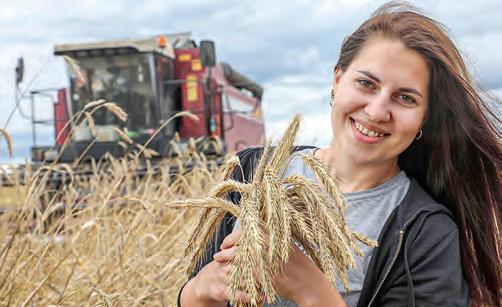
y b . sb
Combine operator Ivan Zharko thinks figuratively
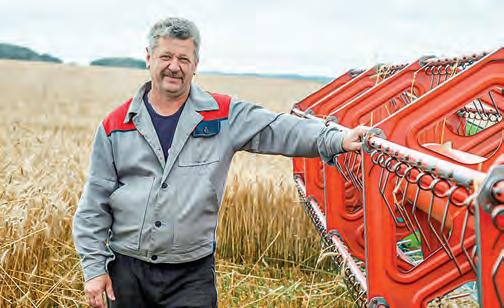
Bread is like breathing
Essay
I’ve been thinking long and hard about the significance of bread. Back in kindergarten, where my father, a musician, worked as a facilities manager on a part-time basis. Once, heading to his “of‑ fice without windows”, that’s what he jokingly called a food storage warehouse, through the kitchen, where there was a table with a desk lamp, and a chair, as well as large boxes, I noticed something interesting. Cook Fyodorovna, sitting on a chair, was pecking something from her palm. A snow-white robe made her look like a big white bird. And also black shiny bead-like eyes… On seeing me, Fyodorovna smiled: “Do you want a meet roll, I’ve just rolled them?” I shook my head and stared at her hands. Fyodor‑ ovna laughed and opened her boat-like palm. I came up and saw bread crumbs. And I felt my little palm turn into a boat and reach for Feodorovna itself. She poured some crumbs to me, stood up and carried on cutting bread bricks on a large wooden board. Having prepared the next portion, she put the rectangular pieces on a wooden tray with edges, and gently piled up the crumbs “Come up, — she said, — smell it. It’s still warm…” Slightly
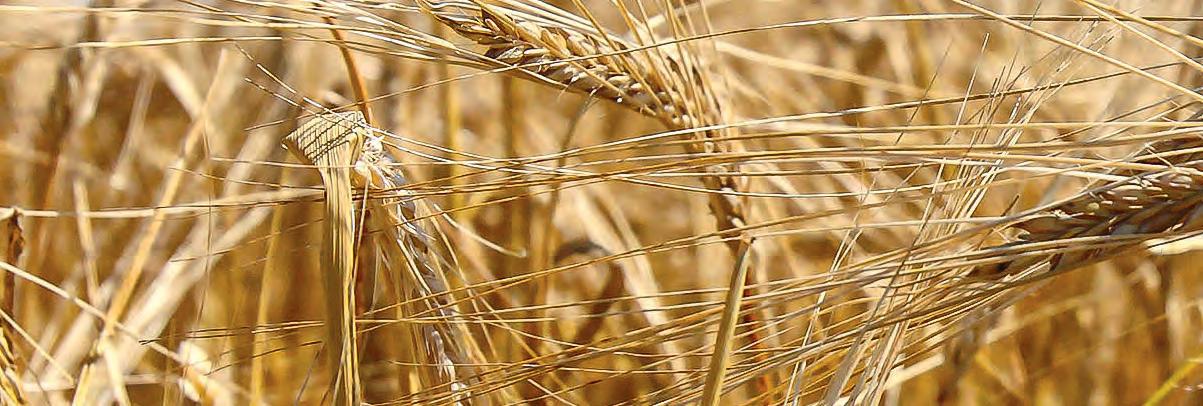
sour aroma of bread mixed with the smell of brownish, stewing in a large pan, pan‑ cakes, pea soup, and berry starch drink By the way, it was made from the berries growing in the kindergarten’s farmstead, where there were both cherries and ap‑ ples. We, kids, helped Fyodorovna’s assis‑ tants to gather gooseberries, raspberries, and black and red currant. And even pick cherries.
I will not forget the way we were taught to distinguish types of berries by their taste. I’m sure we were four or five years old then. Classes were held right in the yard, in the pavilion, an hour before lunch. July was hot then. But summer dry heat was easy for us to bear.
I remember, it was my turn to prove myself. They blindfolded me, led me to the teacher and told me to open my mouth. I felt a big spoonful of berries in my mouth. The fragrant mix had to be chewed, swal‑ lowed, and then, still blindfolded, I was supposed to describe what it consisted of.
I don’t remember any of the children not being able to do that delicious task. Everyone was having fun, especially when the sour taste of red currant revealed it‑ self. The one who was chewing the ber‑ ries, looked mind -numbing, especially when crinkled. After all, most of us had a sweet tooth in those tender childhood years. Those for whom it was too sour, were given a piece of bread.
And I pecked those crumbs of bread imitating homely Fyodorovna. That’s when the bread country began to open up for me. I saw how delicately our cook treated bread. Not a single crumb fell to the floor. And not a word about saving it. It was one of my best lessons to respect bread.
In those distant days of the Soviet Union, the range of bread in the Ukrain‑ ian province was not rich: black rye and gray in the form of bricks, and white was in short supply. It was necessary to get to the bread shop in time for delivery. But in our childhood we did not go into these sub‑ tleties. We did not think about a lack of goods, or that the bread -making plant in our town of Volchansk worked smoothly, but for some reason there was no white bread. We were told: go to buy bread. And we, five -year-olds and six-year-olds, went joyfully, bought a loaf, and it was fun. I can’t help but smile, remembering the bit‑ ten -round loafs we came home with.
How tasty and smelly that bread heel was! As a child, I felt that bread smelled
differently in different seasons. In sum‑ mer it smelled of sweets, honey and h erbs, especially if I was lucky to buy a warm one. And in winter it smelled of cold, as if its aroma closed in the frost. And in winter I didn’t want to bite it, let alone pinch it off — the lips and fingers were freezing. And when in March the sun began to warm up, the bread in our hands on the way home began to breathe. Its slightly warm breath promised us: very soon we will go together to Chalk Mountain for snowdrops, and then for willow branches, which grew behind the airfield on the mountain. And when it gets very warm, the flights of cadets will begin. And we will watch them get into a spin and make a vertical loop… That was what we were talking about once with my girlfriend Allochka. We were standing on the bridge, under which cheerful spring water was running.
How she dropp e d her lo af of bread into it, I can’t figure it out! I remem‑ ber that wet bread got stuck in the bushes, and we tried to get it out. The bread got swollen. It’s all right, I said I’d leave it here, to feed the birds. And we would buy an‑ other loaf. Fortunately, the shop, which the locals called “Belgorodskaya”, was a five- minute walk from us…
Bread is a miracle! It served as a deli‑ cacy for us, too. Especially tasty bread was not at home with soup, but outside. One day my neighbor Valerka went outside with a slice of bread, on which there was, as it seemed to me, snow.
And it was melting in front of our eyes. I ran home to get a piece of bread like that, too. My grandmother, laughing, cut off a slice, dipped it into water and sifted a lot of sugar on to it. She gave it to me and said strange words, which I heard more than once while I was living in Ukraine: we, Himo, people… It means that we are not worse than others.
With a superior air I went out and, sit‑ ting with Valerka on the bench, repeated my grandmother’s words: and we, Himo, people… Sugar crunched in our teeth, and we had fun. Outside we also ate bread with jam, butter and salt. And even with lard. That’s what they call melted pork fat in Ukraine.
And I also liked rye dried crusts, which my grandmother made on the stove and in the oven. Their aroma spread all over our small house, in which there was only a kitchen and a room. I used to take dried crusts from the pantry where they were stored in a large cloth bag. When a student I came to visit my parents on va‑ cation, that bag was still hanging in the pantry. I once told my parents that it was time to get rid of it: there was plenty of bread. That’s what my mother said: “I wish we could have had this sack in the days of forced famine or occupation…”
We gave dried crusts to the neigh‑ bor, aunt Marfa soaked them and fed her chickens.
It’s true, as they say, we all come from childhood. Our habits, characters, pref‑ erences — they all are from there. I still like a heel of fresh bread as well as its aroma. Whenever we go to the village of Yatskovschina, which is in Brest Region, we pass through Kletsk. There we stop at the market and buy brick- bread. It’s hard to buy it in Minsk. It is of excellent qual‑ ity: it is dancing in the hand! That’s what I say, when a piece, after been squeezed, immediately returns to its original form. This bread is baked at the Kletsk breadm aking plant. I cut it into pieces, butter it, sprinkle it with salt, and we drink tea af‑ ter our journey. It has already become a tradition to set the table under the cher‑ ries in the old apple orchard planted by my husband’s parents — Ivan Iosifovich and Elena Grigoryevna. So the other day at the weekend they were remembered to the rumble of harvesters which were working from morning till late at night. Harvesting is going on in Belarus. And the weather is favorable. My husband told me that when a schoolboy he helped his father on the combine harvester on those hot days during harvesting.
We also went to the village and watched the combine harvesters moving smoothly across the field. In the morning, the first “niva” arrived at the field. The combine harvester made two lanes and took its stint. And then four more com‑
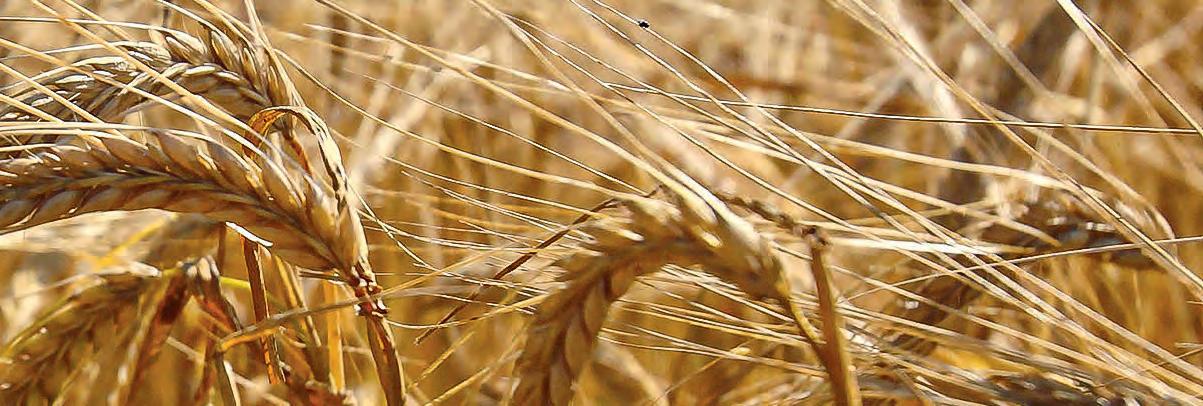
bine harvesters arrived. And the combine operators, all together started working on their plots. And the lorries were already waiting for them to be loaded. There was a fire truck on the side of the road: it’s hot, anything may happen.
It’s magic when you see a full flow of grain spilling into the body of powerful large truck. And no less miraculous are the groups of storks that follow the harvesters walking along the stubble. And they’re not afraid! My husband said: soon it will be a fine day mice! And I add: and for cats.
We also talk about hard work of com‑ bine operators: rumble, dust, heat… It’s nice for us citizens to watch the harvesting process from outside. And how straw for rolls flows from under the wheels of the combine, and what smooth rows it makes. And how nice these rolls look on a stub‑ ble field! And what a pleasure it is to chew wheat grains! Moreover, to take five or six tablespoons of grain, pour warm water, leave it for twelve hours. And here it is, a drink of the Slavs called — suritsa. Fil‑ ter it and drink to your health! You can add water once again. And if you leave the grain in a jar, it will give sprouts. Many people know how good they are. There are plenty of vitamins and minerals in them.
That’s what it is, the grain, the basis for the bread!
For many years, I associated the im‑ portance of bread with the crumbs of the c ook Fyodorovna. That’s why I have nev‑ er thrown a slice away, having once seen h ow carefully she treated it, how much bread was valued in the family. But I never thought about the value of flour or the grains from which it was made. Even when in high school we were jumping on a haystack. It was fun climbing to its very top and going down. And in my youth I did not realize the hard work of those who sow, grow, harvest grain. Moreo ‑ ver, it’s sacred. And now I understand it k eenly that bread is really the head of eve‑ rything. It’s like breathing, without which t here is no life. And in the house, it’s the master.
And if there is bread, as people say, and there will be a song. By Valentina Zhdanovich







